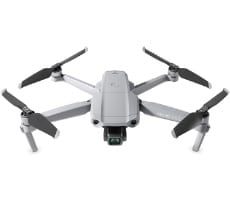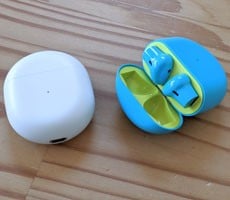Lenovo Smart Clock Review: A Bedside Google Assistant
The touchscreen interface is very streamlined. The weather screen will show you the forecast for the week, while the calendar screen will provide you with a short list of your upcoming appointments. You can change the volume of your music with the on-screen controls, through voice command, or by pressing the buttons on top of the device. You can also pause, play, or skip songs with the on-screen controls or voice command. It is important to note that the Google Assistant cannot directly access your playlists from your preferred music streaming services though. You will need to ask Google Assistant to play a specific song or music from a certain artist.
The smart clock’s interface is rather limited, however. For example, you cannot access any additional information about the weather directly from the touchscreen. You will need to modify your location in the Google Home app, if you need to make any adjustments. You also cannot make any changes to your Google Calendar or reminders through the smart screen. You can only click on your next appointment to slightly expand your list of events. However, you can make changes to your calendar or ask Google Assistant about weather in other areas through voice command.
The smart clock will also send requested recommendations to your connected smart device. For example, we asked Google Assistant about the best-rated coffee spots in our local area. The Google Assistant sent a list of these coffee places to our smart device.
If you swipe up on the screen, you can access your alarms, create a “nap timer”, or press “Play Music”. The nap timer sets a default timer for 20 minutes, but this can be altered. The “Play Music” button will select random music from your preferred music streaming service or resume whatever it left off last time it was used.
You can directly modify the device’s alarms through the touchscreen. You can access the alarm either by swiping up or right on your device. You can turn your existing alarm on or off, set a new one, or make modifications. You are able to choose your alarm tone, determine your “snooze” length, adjust your volume, and decide whether or not you want to snooze or stop your alarm by giving it a hard “tap” on the top of the device. Users can silence their alarm through the hard tap, the on-screen options, or voice command. We found that the device easily snoozed when it was tapped like other alarm clocks. Google Assistant will also suggest alarms on the smart clock. It will recommend alarms based off of your schedule or your usual alarm routine.
You can set up “routines” as well through the Google Home app. For example, after our alarm goes off in the morning, Google Assistant tells us the weather, our morning commute, our calendar, and any reminders. You can also set up “routines” for the evening and when you leave and return to your home. These routines can be particularly helpful if you own several smart home devices. All of these routines can be edited in the Google Home app, but you cannot edit these routines directly on the smart clock’s touchscreen.
We should also note that some of the screens cannot easily be closed. For example, if you click “set alarm”, but do not set one, you will need to wait roughly ten seconds for the smart clock to return to the home screen. This is a minor inconvenience, but it can be rather bothersome if you are in a hurry.
The Lenovo Smart Clock had no issues connecting or controlling our other Google Assistant-enabled devices. We tested the smart clock with a Google Chromecas and it was seamlessly able to play and pause videos and adjust the volume. If we asked the smart clock to play a video while the Chromecast was already streaming something else, it would confirm that we wanted to make a change. You can also play music on the Lenovo Smart Clock in one room, stream a video through the Chromecast in another, but control both devices with the smart clock. If you have multiple devices playing at once, you will simply need to specify which device you would like to adjust.
You will need to ask the smart clock to play a certain video or a certain kind of video on your connected device (like a Chromcast), because the smart clock itself cannot directly access things like your YouTube subscriptions or preferences from other streaming services. You will need to use your smart device if you do not know which exact videos you would like to stream.
The speaker built into the smart clock was able to fill a large room with sound. The music was clear and well-balanced and Google Assistant was easy to understand. We did find it occasionally difficult to access Google Assistant with voice command if audio was playing loudly, though. The Lenovo claims that the device should be able to hear you from up to 8 meters away (26 feet), and we found this to generally be the case, unless the Google Assistant was struggling to hear us when we were playing music loudly from the device and when we were watching a movie through our television. When there was loud audio interference, we found that we needed to stand much closer to the device and to speak more deliberately for it to hear us in these situations.
We also found that the Google Assistant often did not respond to our voice commands when the smart clock alarm was going off. Human voices tend to be raspier and quieter first thing in the morning, which was probably a factor. However, this inconvenience feels like an oversight for a product that touts itself as an alarm clock. The smart clock had no issues responding to our voice commands as long as we spoke in a clear voice at a reasonable volume, however.
This device arrives at a time when many consumers are concerned about privacy. Thankfully, the Lenovo Smart Clock does not include an invasive screen or camera, and while it does have a microphone, but it can be turned off with a physical hardware switch. This device would be a great product for those who want the benefits of a smart device, but do not necessarily want or need a large screen or want something that will be listening all the time.
The Lenovo Smart Clock with Google Assistant would not be quite as useful in an office or kitchen where the user may need additional features. For example, it is unable to directly make changes to your calendar or play videos. If you need a larger screen with more capabilities, you may instead want to check out the Lenovo Smart Display or Google Home Hub.
Ultimately though, we found that the Lenovo Smart Clock was easy to set-up, compatible with our other devices, and performed as promised. The device is an unobtrusive addition to a bedside table and offers several useful features through Google Assistant. At $79.99 USD, it is also one of the least expensive Google Assistant-enabled devices on the market. It is at least $40 cheaper than its main competitor, the Amazon Echo Spot and it's more affordable than the Google Nest Hub too. All things considered, the Lenovo Smart Clock With Google Assistant is a well designed and thought out device that we enjoyed using and we can easily recommend it.

|
|












